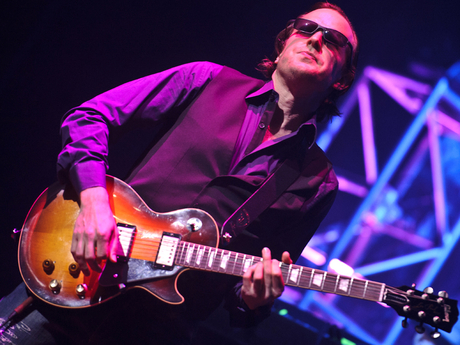
Want all the hottest music and gear news, reviews, deals, features and more, direct to your inbox? Sign up here.
You are now subscribed
Your newsletter sign-up was successful
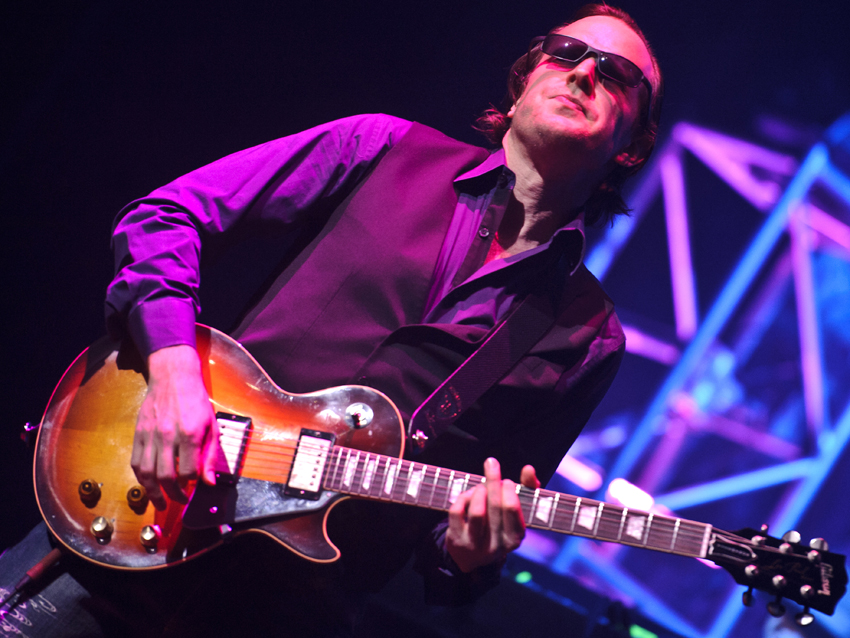
Joe Bonamassa went for a classic British rock sound on Black Country Communion 2. © Chris Schwegler/Retna Ltd/Corbis
"'Let's make a kick-ass record.' That was basically our goal when we went into the studio to cut this album," says Joe Bonamassa of the just-released Black Country Communion 2, which follows the band's almost-self-titled debut (it was called Black Country) by just nine months.
Comprising Bonamassa, lead singer and bassist Glenn Hughes, drummer Jason Bonham and keyboardist Derek Sherinian, the band, with ties to Deep Purple, Led Zeppelin and Dream Theater, were immediately tagged a 'supergroup,' a label Bonamassa is quick to dispel.
"That whole 'supergroup' thing hung over us while we cut the first record, and we just kept our heads down and hoped it would go away," he says. "On the second record, though, I think the stakes were higher. We had to prove that we weren't just a one-time experiment that [producer] Kevin Shirley threw together. We were dedicated to outdoing ourselves on every level and proving the naysayers wrong. And we did it. We're been together for almost two years, and we've already made two records, which is more than most bands make in five years."
With Black Country Communion 2 claiming the number one spot on the UK rock chart in its first week of release, Bonamassa and company have gone a long way towards silencing doubters and haters. "Just to be accepted as a real, living and breathing band is all we ask for," the guitarist says. "Whether you like us or not, that's fine. But just know that we're serious and that we're not the equivalent of a prefab boy band with instruments. That's not what we're about."
During a rare break on his seemingly endless tour schedule, Bonamassa sat down with MusicRadar to talk about the making of Black Country Communion 2. He also discussed some of the recent additions to his bulging guitar collection. What's more, the blues-rock titan happily held forth and answered some questions from MusicRadar readers.
You have a new Gibson Joe Bonamassa Les Paul Studio model. Tell us about it.
Want all the hottest music and gear news, reviews, deals, features and more, direct to your inbox? Sign up here.
"About a year a ago, I had a meeting with the folks at Gibson. They said they wanted to do a USA model with me. My Epiphone model had been a huge success, so that was cool, but as far as doing a Gibson USA model, my criteria was pretty simple, and it was really based on price.
"I threw out a number, and they said, 'We can do that as a Studio model,' which appealed to me because I thought it could be my own version of the Gary Moore model they did several years ago.
"Some time goes by, and I get a call from Pat Foley from Gibson, who tells me, 'I'm holding in my hands a prototype of the Joe Bonamassa Les Paul Studio model.' I was like, 'What?' [laughs] So when I got a chance, I checked it out, and it was awesome. They did a fantastic job on it - the wood, the pickups, the appointments, it's all top-notch - and what I really like about it is, it gives people a chance to buy a premium guitar at a price that won't kill them. It's a beautiful guitar for the price, and you can't say that a lot nowadays."
Speaking of prices, we understand you recently acquired a bona fide sunburst 1959 Les Paul Standard.
"I did. Yes, I did. I had to do it. But see, I don't look at it as simply buying a really expensive guitar - I look at it as choosing between a guitar and a house. [laughs] I've committed fully to apartment living. Yeah, I got a really cool '59 'Burst, and the guy I bought it from has been nice enough to let me pay it off on time.
"The guitar has changed my life. The whole mythology of the '59 Burst… there's something there, for sure. When I plugged it in, I was like, 'There's that sound.' That Paul Kossoff sound I've always been searching for. It's clean, bright, but it has a top-end that rolls off in a very musical way."
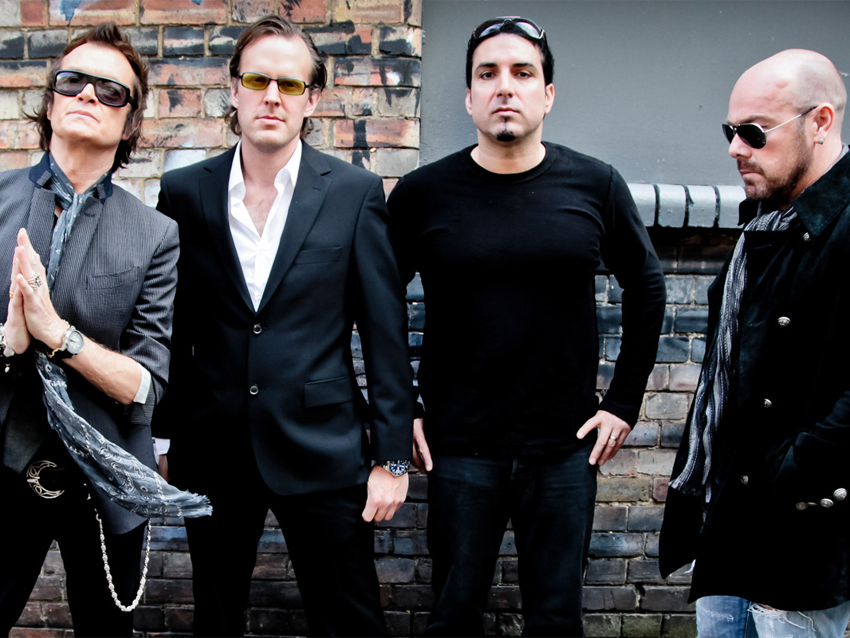
Black Country Communion are (left to right) Glenn Hughes, Joe Bonamassa, Derek Sherinian and Jason Bonham. © Christie Goodwin
So, just like owning a real Warhol or Picasso, having a real 1959 'Burst goes beyond a 'cool' factor?
"Oh yeah. It's like owning a Stradivarius. I have two or three '59 reissues that are fantastic, and they're there. You plug 'em in, you hear 'em, and it's like… they sound unreal. To try to tell the difference, you might as well get out the wine tasters, you know what I mean? [laughs] They're there. But the real '59... when you play it and you hear it, it drives you to a different place. You feel as though the guitar responds to your every move, good or bad.
"It's an Aston Martin, and only an Aston Martin handles like an Aston Martin. There's great cars, and then there's Aston Martins. Same thing for the 1959 Les Paul - it's an authentic piece of art that can never truly be replicated, and its mysteries are special. What's really cool about it is, when you put it in the middle position, it's out-of-phase like Peter Green. I'm like Frodo in Lord Of The Rings with this thing - it never leaves my sight."
Before we talk about the new record, we have some reader questions. Logan Thompson asks, Besides your 1959 Les Paul, what is your favorite guitar out of your entire collection and why?
"There's three that are tied for first. I have a 1969 Grammer Johnny Cash acoustic guitar, and it's so inspirational. I have some really nice Martins, but the Johnny Cash Grammer… there's songs in it. I'm not a big acoustic guy, really, but there's something to this model.
"Then there's the first Joe Bonamassa Custom Shop model. I have the first one, with the 001 serial number, and it's just killer. It responds to my every move. It's just like the '59.
"And then there's a '53 Telecaster, which looks like Danny Gatton's guitar. I'm not known for playing Fenders much anymore, but this guitar is amazing. I always wanted a guitar like Danny Gatton's, and this one comes pretty close. If the house was burning down and I had to run out with some guitars, these ones and the '59 would be the ones."
Graham Campbell says, I love your live rig setup, but how would somebody get your core sound on a budget?
"That's a really good question. It all comes down to this: not every amp does everything. Let's say you have a $200 budget, OK? What I would do is, I would buy a cheap tube amp with some gain and compression, and I'd buy a cheap solid-state amp that's really direct and immediate - and I'd blend the two together. And believe me, you can get two amps like these for that kind of money. They're out there. Get one amp that blends the highs and lows and one that handles the mid-ranges. It can be done."
Andrew Allen Walton asks, What was that Telecaster you played when you were a young fella?
"Young fella, as in 25 or so? It wasn't actually a real Telecaster, it's a Gigliotti. A Gigliotti is a really cool custom Tele-style model with a brass top and a mahogany back, sides and neck. They still make 'em, and they're terrific."
Chris Morley says, I'm assuming that BCC will be headlining a tour, but if you were offered the chance to open for someone, who would you want to open for and why?
[laughs] "I love it! You know who I'd like to open for? This will be a surprise, but I'll tell you who: Iron Maiden. People can throw shit at Glenn Hughes. [laughs] It's a tough gig. The guys in Maiden even admit that it's tough. But I think if you can go out in front of an Iron Maiden audience and show the crowd that you mean it, then you can basically play anywhere, anytime, anyplace. Plus, I love Iron Maiden, so I wouldn't mind seeing them every night. Opening for Iron Maiden would be a blast."
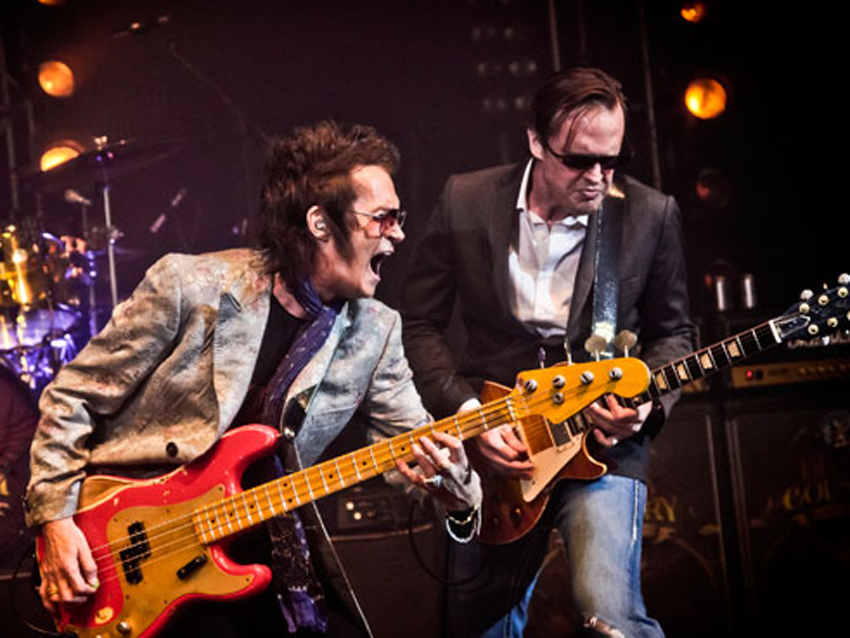
Bonamassa says that singing with Glenn Hughes will make a guy "stand or fall." © Christie Goodwin
Tell us about the Gary Rossington Les Paul you've been using lately.
"I bought that guitar when it wasn't even fashionable to do so. I got it at the Guitar Center in LA in 2004 for something like $2000, and now these guitars are worth over $7000. It's a great guitar for BCC because it's got a really rich mid-range sound and it's very aggressive. You can really manhandle it. It doesn't work so much for my solo stuff, but for BCC, it's basically my main guitar. It's got that right amount of meaty tone."
And then you've also been playing a Steve Morse Music Man…
"That's right. I have a stock Steve Morse model, the Y2K. It's got three pickups, not four, and it doesn't have all the switches. But the nice folks at Music Man made me a couple of models, one in black and another in like this Daphne Blue color. They're really terrific. The headstocks are reversed. In America I use a black one, and in Europe I use the blue one. But it's more of a recording guitar, really. It's kind of Jimmy Page-ish, the way he'd use certain Telecasters on albums."
OK, let's get into the record a bit. Last time out, you guys had something like five days to make the whole thing. This time out, you had, what, five-and-a-half days? What a luxury!
[laughs] "Yeah, tell me about it! It was something like two weeks when all was said and done, and I'll tell you, by the time we were finished, we were having a real goof! [laughs] We were having a blast.
"The first record was very intense, but this time there was more of a structure and a plot to everything. We did it at East West Studios - the Chili Peppers were right next door working on their new record - and it was cool. We definitely felt like more of a band instead of a project that Kevin threw together.
"It was really collaborative, as well. Jason brought in a song called Save Me, from the time that he was working with what was going to be Led Zeppelin, right after their O2 Arena gig, and that turned out great."
Kevin said in an interview that he wanted to explore more of the 'Bonham sound' on this record. How did he go about this?
"Well, I can't answer that per se because I'm not an engineer. The thing people forget about Kevin Shirley a lot of the time is that he's not only a great producer, he's also a world-class engineer. He really knows how to get a sound.
"Jason Bonham came in with his kit, and you know, we're talkin' about a guy who can play When The Levee Breaks and make it sound like Led Zeppelin. He's got it in his genes. He's one of the few people on earth who can do that. But how do you capture that? Kevin did. A lot of the other producers and engineers in the studio started sniffing around, like, 'Hey, how did you do that?' It was pretty funny."
There's some great rockin' tracks on the record, but you do take some left turns with songs like The Battle For Hadrian's Wall.
"Yeah, that was my song. I wrote that one. For some reason, I wrote it at the top of my vocal range. I wrote it in the key of A, but I said, 'The hell with it, I'm gonna do it.' So I went for it. Whether I'm going to be able to sing it live remains to be seen. I'll need a lot of glasses of water and some oxygen." [laughs]
Your solo in Man In The Middle has more than a hint of Jimmy Page to it. Does that just happen when one plays with a Bonham?
"There's a lot of Jimmy Page all over the album, really. That just happens when you play this kind of material. I solo live in the studio, total improvisation. I don't sit in the control room and comp solos bit by bit. I play everything live. So if we're talking about something Zeppelin-y before we cut a song, it's going to come out that way."
There's also a classic British rock vibe on many parts of the album - the Hammond organ and the way you double the parts on the guitar, some of which sound very Ritchie Blackmore-ish. Intentional?
"Sure. On The Outsider, we definitely went for Highway Star in some places, much to Glenn Hughes' chagrin. I'd say we were unapologetically British rock on a good portion of the record, if not the entire record. Nothing wrong with that, in my opinion. British rock from the late '60s and early '70s was some of the best stuff around, so if we cribbed from that, well, there's worse things you can do.
"Look, we're not trying to make anybody's cool list. We're not trying to be the next Arctic Monkeys or anything like that. We went into the studio to make a modern rock record with a classic rock sound. That's always been the rallying call in BCC.
"Take a song like Save Me… that took me back to my childhood in such a cool way. It's so retro. There's nothing wrong with using a retro sound. That's like telling a filmmaker that he can't be influenced by Citizen Kane or something like that. Why would you do that? As long as you're honest about what you're doing and you acknowledge your influences and intent, that's cool. We'd never try to pass this stuff off as our own invention. In fact, the whole album is one giant homage."
Crossfire is a cool blues track. When you guys sit around, what blues artists do you talk about and reference? Are you the go-to blues guy for the other band members?
"I don't know if I'm the 'go-to' blues guy. I know why you'd say that, but everybody in the band has a pretty strong blues background. You know who we talk about? The entire band - or at least Glenn, Jason and I - really bond over Free. Free is a huge group with us. Then there's Zeppelin, of course. But most of the time, we take a Free approach to the music. If I can channel Paul Kossoff in my playing, I'm a happy guy."
Speaking of Zeppelin, we love Smokestack Woman. You play a theremin on the track. Now, you've played one before [on the song The Ballad Of John Henry] but tell us, do you have any specific approach to it?
"What's weird is, the song itself isn't Zeppelin; it's more like Humble Pie. Right there, you might not think 'theremin.' I don't know… It's a very creative instrument. It certainly adds a lot to a live show, but in the studio, you have to treat it as a tension-and-release thing. It's like bending a note. You can take it wide if you want, but you have to keep it musical. If you're just going to get stupid with it, then you're just being silly; you're not really playing music."
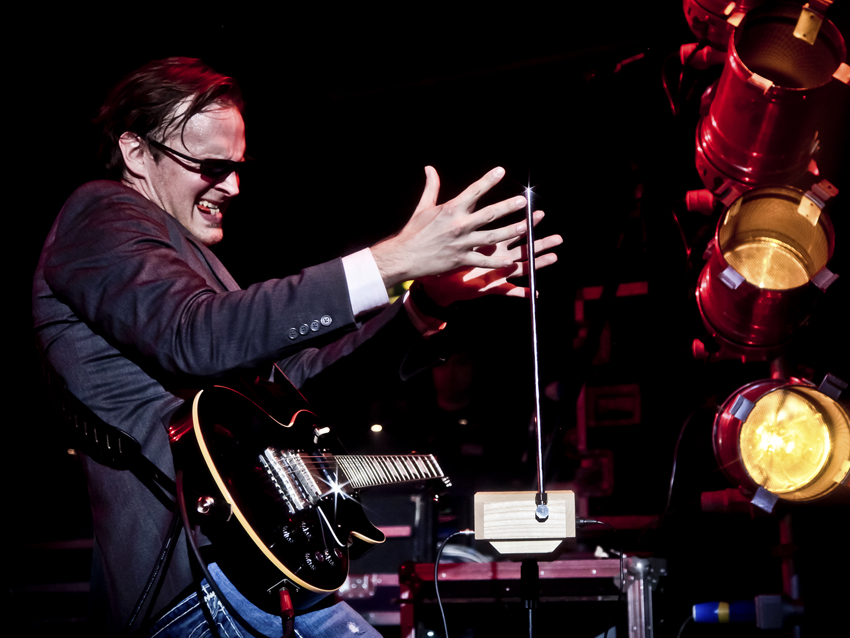
Sporting a 2008 JB Les Paul signature model, Bonamassa rocks a theremin. © Christie Goodwin
Overall, what did you come away with from this second recording experience with BCC that you didn't the first time?
"Well, like I was saying before, I think we came away from making this record knowing that we're a real band. We felt that way on the first album, but with the second record, which we recorded very soon after the first, that point was really driven home. It wasn't about 'OK, have your people call my people'; it was more like, 'All right, here we are in a room, let's jam!'
"We weren't trying to be a supergroup. We really wanted to be a band, as trite and corny as that sounds. We wanted to take an old sound and make something new out of it. Thankfully, the first album was pretty well received, so we felt good going in to make the new one. I think we definitely kicked things up several notches this time. Now we're not trying to be a band; we are one."
What kinds of things have you learned from the other guys? In turn, what do you think you've taught them?
"That's a good question. I learn so much about singing from working with Glenn Hughes. When you have to go up against a guy like that, c'mon, you're either gonna stand there or you're gonna fall. The guy is one of the greatest rock vocalists out there. If you can hit some notes with him and not look ridiculous, then you can live again to fight another day.
"From Jason, I've learned so much about the space in music. He has an approach to the kick and the snare, you could drive a truck through what he does. It's a feel, it's a dynamic, it's a style. It's something that is so magical, I'm just glad to be a part of it.
"From Derek, I've learned things about music that I can't even put into words. Modes and things - I never know what mode I'm in, but Derek knows all of that, and somehow it creeps into the music I play with him. That's the cool thing about musical osmosis that happens when you play with somebody far beyond your level. They make you better than you are, or they make you realize that you're better than you thought you were.
"What have I taught them? [laughs] That's a hot one! Uh… probably not much. I'm just the lucky guy who gets to tag along, really."
Joe is a freelance journalist who has, over the past few decades, interviewed hundreds of guitarists for Guitar World, Guitar Player, MusicRadar and Classic Rock. He is also a former editor of Guitar World, contributing writer for Guitar Aficionado and VP of A&R for Island Records. He’s an enthusiastic guitarist, but he’s nowhere near the likes of the people he interviews. Surprisingly, his skills are more suited to the drums. If you need a drummer for your Beatles tribute band, look him up.
